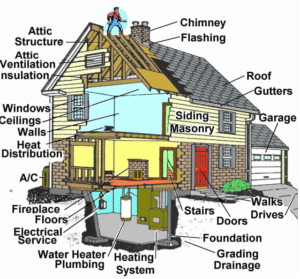The Inspection
 Once the offer has been negotiated and agreed upon, we will move toward closing the transaction. There are many steps here and one of the most important is having the home inspected. The buyer hires the inspector and pays for the inspection. I have a number of home inspectors that I can refer to you or you might find your own licensed home inspector. The inspector will be looking for material defects which pose a health or safety issue to the buyer. The general categories of material defects include the roof, the electrical system, the furnace/heating system, cooling/HVAC system, plumbing and pest infestation. Other defects may only be cosmetic.
Once the offer has been negotiated and agreed upon, we will move toward closing the transaction. There are many steps here and one of the most important is having the home inspected. The buyer hires the inspector and pays for the inspection. I have a number of home inspectors that I can refer to you or you might find your own licensed home inspector. The inspector will be looking for material defects which pose a health or safety issue to the buyer. The general categories of material defects include the roof, the electrical system, the furnace/heating system, cooling/HVAC system, plumbing and pest infestation. Other defects may only be cosmetic.
The Important Things To Know About The Inspection:
The inspection process takes between 2.5 and 4 hours depending on the size and complexity of the home and systems. The cost runs between $325 and $500 (more if larger or additional dwellings are included), and it is paid at the time of the inspection. It is best and recommended that all parties are present – the real estate broker and the buyer(s).
The inspector will provide you with a report that outlines the defects he/she found with the property. After the inspection is done, you can:
- Negotiate with the seller to have some or all of the defects fixed,
- Negotiate the home price with the seller based on the defects found,
- Take the home “as is” or
- Terminate your offer.
The MLS/NMAR has a response form for the inspection which will be used and signed by you. In our response, we will ask the seller to use a licensed, bonded and insured contractors for major work and to give us the receipt for the completed work. All work must be done prior to closing asking receipts for proof of repairs unless specifically negotiated in the contract using an additional addendum. It is not uncommon for the seller to offer money in lieu of having the work done. You will be the one to decide if that works for you or not.
With FHA loans, we sometimes don’t have a choice about having the work done by closing since that some issues get “red tagged” by the appraiser. Funding will not happen until the problem is corrected, and the appraiser must re-inspect the property after all problems are corrected. Therefore, if you have an FHA loan, it is in your best interest to have the defects corrected before the appraiser is scheduled to appraise the home.
What Happens If I Elect To Waive An Inspection?
Some buyers opt to do exactly that. But remember, you are buying the home in “as is” condition. Anything that comes up later as needing repair will be your responsibility. Keep in mind that many lenders will require inspections on certain loan programs, and you are responsible for the expenses.






